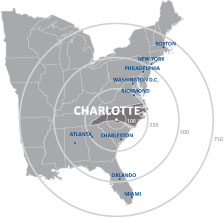|
|
Organizing for Economic DevelopmentBy CED Guest AuthorPublished September 20, 2013
After months of negotiation, the Monroe-Union County Economic Development launched in the Spring of this year. The organization’s two year work plan is available here.Again, prior to January 2013, Union County contracted with a non-profit organization to represent the County’s interests in Economic Development. The City of Monroe, the county seat and largest municipality, owned or controlled most of the County’s economic development infrastructure (water, sewer, airport, etc) and relied on its own economic development team. In 2013, the County and City created a joint partnership to carry out economic development on behalf of the entire county with a single voice to represent its collective interests. Then entity was created by interlocal agreement between the County and City of Monroe. Funding for the joint effort is being provided by the County ($400,000), the City of Monroe ($300,000). Voting board members are appointed by the County Commissioners and City Council, with appointments divided evenly between the governing boards. Other towns in the county can have a voting seat on the board with a $7,500 annual contribution. Each board member represents a private business interest in the County (no local government officials have voting board positions). Public Officials from the County and City governments, the community college and other major public institutions are designated as “ex officio” (non-voting) members. *Photo from Monroe Union County Economic Development Will Lambe authored the NC Rural Center report, Small Towns, Big Ideas, and he served as Director of the Community and Economic Development Program at the School of Government from 2009 to 2014. |
Published September 20, 2013 By CED Guest Author
 A series of posts last year profiled case studies for “How Counties Organize to Carry Out Economic Development.” Links to the series can be found here (parts I, II, III, IV, and V). The fifth case profiled Union County, NC, where—at the time—local leaders were considering a new multi-jurisdictional partnership between the City of Monroe, the County and other municipalities in the County. For years, the County and its largest City (Monroe) were represented by separate organizations with separate leadership.
A series of posts last year profiled case studies for “How Counties Organize to Carry Out Economic Development.” Links to the series can be found here (parts I, II, III, IV, and V). The fifth case profiled Union County, NC, where—at the time—local leaders were considering a new multi-jurisdictional partnership between the City of Monroe, the County and other municipalities in the County. For years, the County and its largest City (Monroe) were represented by separate organizations with separate leadership.
After months of negotiation, the Monroe-Union County Economic Development launched in the Spring of this year. The organization’s two year work plan is available here.Again, prior to January 2013, Union County contracted with a non-profit organization to represent the County’s interests in Economic Development. The City of Monroe, the county seat and largest municipality, owned or controlled most of the County’s economic development infrastructure (water, sewer, airport, etc) and relied on its own economic development team. In 2013, the County and City created a joint partnership to carry out economic development on behalf of the entire county with a single voice to represent its collective interests.
Then entity was created by interlocal agreement between the County and City of Monroe. Funding for the joint effort is being provided by the County ($400,000), the City of Monroe ($300,000). Voting board members are appointed by the County Commissioners and City Council, with appointments divided evenly between the governing boards. Other towns in the county can have a voting seat on the board with a $7,500 annual contribution. Each board member represents a private business interest in the County (no local government officials have voting board positions). Public Officials from the County and City governments, the community college and other major public institutions are designated as “ex officio” (non-voting) members.
*Photo from Monroe Union County Economic Development
Will Lambe authored the NC Rural Center report, Small Towns, Big Ideas, and he served as Director of the Community and Economic Development Program at the School of Government from 2009 to 2014.
Author(s)
Tagged Under
This blog post is published and posted online by the School of Government to address issues of interest to government officials. This blog post is for educational and informational Copyright ©️ 2009 to present School of Government at the University of North Carolina. All rights reserved. use and may be used for those purposes without permission by providing acknowledgment of its source. Use of this blog post for commercial purposes is prohibited. To browse a complete catalog of School of Government publications, please visit the School’s website at www.sog.unc.edu or contact the Bookstore, School of Government, CB# 3330 Knapp-Sanders Building, UNC Chapel Hill, Chapel Hill, NC 27599-3330; e-mail sales@sog.unc.edu; telephone 919.966.4119; or fax 919.962.2707.

